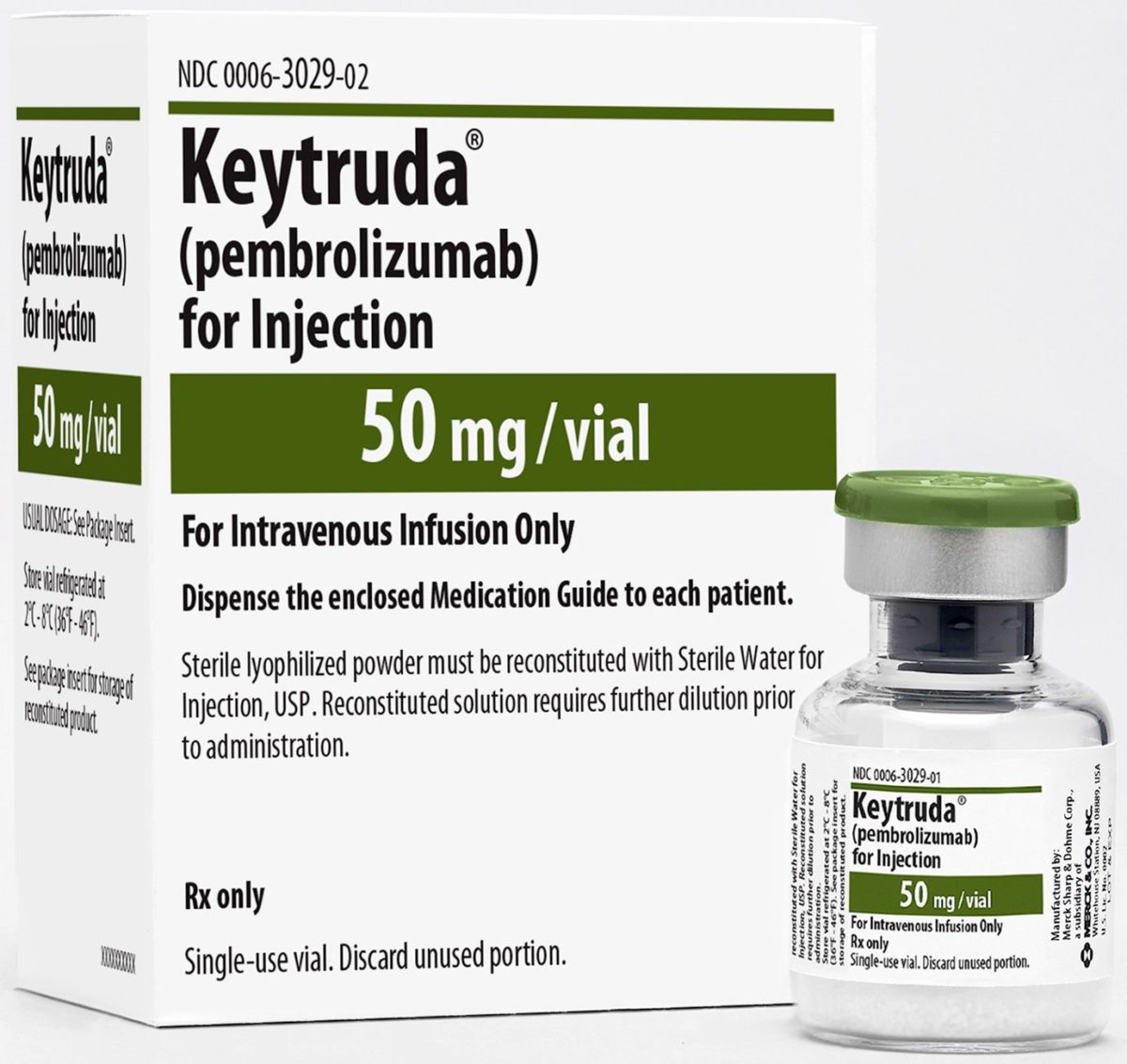Category: Research

Keytruda Approved by FDA for Further Potential Treatments of Mesothelioma
Keytruda, an antibody drug used in cancer immunotherapy manufactured by Merck and also known as Pembrolizumab, has been approved by the FDA for treatment of solid tumor cancers. Previously, the drug had only been approved to treat non-small cell lung cancer. This is an important development for certain mesothelioma patients.
In a press release, the FDA said that clinical trials showed an effective response rate for 29 percent of patients with mesothelioma and other applicable tumors that displayed high levels of mutation. While there is still no cure for mesothelioma, of those who participated in the trial, half saw a benefit for an additional year, while the other half demonstrated benefit for an additional two years.
The drug works by targeting the cellular pathway of proteins found on the body’s immune cells and some cancer cells. By blocking this pathway, Keytruda may help the body’s immune system fight cancer cells.
The previous FDA approval in 2015 came after a U.S. clinical trial found Keytruda to be effective in controlling mesothelioma tumors in three-fourths of patients, leading researchers to say the results are “encouraging.”
Like lung cancer, pleural mesothelioma is an aggressive cancer that is challenging to treat. Pleural mesothelioma can take decades to display symptoms and can leave patients with life-threatening complications. The asbestos-caused cancer affects the lining of the lungs and often leaves patients with less than 18 months to live after diagnosis.
Patients diagnosed with malignant mesothelioma are encouraged to speak with their oncologist or consult with a Mesothelioma Center of Excellence to determine whether Keytruda can be an effective treatment. We at MesotheliomaHelp.org are always available to assist you.

New Treatment Using Transarterial Chemoperfusion Shows Promise for Mesothelioma Patients

NIH “All of Us” Program May Guide Research for New Treatments For Mesothelioma
The National Institutes of Health has announced its “All of Us” research program is now open for enrollment. The program is looking for one million people to share their health information over decades to be used to speed up health research breakthroughs and to advance precision medicine.
Part of the Precision Medicine Initiative introduced by President Obama in January 2015, the “All of Us” program was created to support research to develop more effective ways to prolong health and treat disease. With the data bringing so many different “genes, microbiomes, environments, and lifestyles,” the information will make possible “more effective, targeted treatments for diseases like cancer and diabetes.”
“Imagine the power of a project that asks 1 million people from across the United States to volunteer to help find answers about virtually all health conditions we face,” said Alex M. Azar II, the secretary of Health and Human Services, and Francis S. Collins, the director of the National Institutes of Health, in an opinion piece they wrote in USA Today on May 7.
https://www.usatoday.com/story/opinion/2018/05/07/all-us-research-medical-issues-national-institutes-health-column/584949002/
Data Opens Door to Precision Medicine
The ultimate goal of the project is to create a database containing genetic information, biological samples, and dietary and lifestyle information of one million Americans who volunteer to share this information and, potentially, their electronic health records. This information will be used to “lay scientific foundation for precision medicine for many diseases,” according to the NIH.
https://syndication.nih.gov/multimedia/pmi/infographics/pmi-infographic.pdf
Precision, or personalized, medicine targets health care to the unique makeup of people and their diseases optimizing the potential for success of the treatment. This approach is especially beneficial for mesothelioma and other rare disease research.
Hoping for enrollees from “communities that have inadequately benefited from previous findings and breakthroughs,” Collins and Azar see the data as a way to “help science answer important questions about today’s growing epidemics and mysteries.” Mesothelioma continues to confound researchers and oncologists, so the unprecedented amount of data can only help improve outcomes.
“All of Us” Is Important to Mesothelioma Treatment
“By signing up for All of Us, you will join a mission to accelerate an emerging field called precision medicine,” said Azar.
Nearly 3,000 Americans are diagnosed with mesothelioma each year. There is no cure for the cancer, but treatments intended to go after the unique characteristics of the disease have shown promise. Oncologists and mesothelioma patients are hopeful that this approach to research will bring personalized care to the forefront of treatment strategies.
The NIH reports 27,000 people have already enrolled in the study.
“We have the opportunity to better understand and anticipate how the complex interactions of behavioral, biological, environmental and socioeconomic factors may affect the health of each us — as individuals,” said Azar and Collins.
“Understanding these interactions may be key to developing treatments that deliver more value and better health for every American.”
For more information and to enroll, visit JoinAllofUs.org.

Combination of Electric Fields and Chemotherapy May Be A New Treatment Option for Pleural Mesothelioma Patients
The key to increasing survival for mesothelioma patients is to kill the cancer cells before they can spread to other organs. Treatment options, including surgery, chemotherapy and radiation, all contribute to a patient’s survival, but many times the prognosis remains unchanged. Now, one company has turned to experimenting with delivering electromagnetic waves to the chest of pleural mesothelioma patients and reports improvements in overall survival when combined with chemotherapy.
Novocure, a UK-based medical device company that develops and markets Tumor Treating Fields delivery systems, developed the novel devices as an alternative way to destroy tumor cells while sparing healthy tissue. Already approved by the U.S. Food and Drug Administration for the treatment of brain cancer, the device is now in a Phase II clinical trial for pleural mesothelioma patients.
In April, researchers gave an interim review of the STELLAR clinical trial reporting that the first 42 pleural mesothelioma patients treated with the combination of Tumor Treating Fields (TTF) and pemetrexed and cisplatin or carboplatin had a one-year survival rate of 80 percent, compared to 50 percent in the chemotherapy only patients. Median progression free survival was 7.3 months versus just 5.7 months in the chemotherapy controlled group.
“We are extremely pleased with these top-line results, which bring us one step closer to realizing the potential for a new treatment for mesothelioma patients in desperate need,” said Dr. Eilon Kirson, Novocure’s Chief Science Officer and Head of Research and Development, in an April 17 press release.
The NovoTTF-100L device used in the clinical trial provides mesothelioma patients with a round-the-clock treatment option that allows them to maintain an active lifestyle without interference to activities such as walking outdoors, shopping, and cleaning. Connected to the patient via insulated electrode arrays placed on the upper torso, the device delivers low-intensity alternating electric fields to the region near the mesothelioma tumors. The TTF is inconspicuous and light enough to carry to most functions and activities. The device needs to be active approximately 18 hours a day. According to the company’s website there are no limiting side effects.
“Mesothelioma is the first torso indication for which Novocure will pursue FDA approval,” said Dr. Kirson.
Novocure previously received a Humanitarian Use Device (HUD) designation for the use of TTF for pleural mesothelioma. The next step is to submit a Humanitarian Device Exemption (HDE) application to the FDA. For medical devices, an HDE exempts the businesses from proving effectiveness of the device. However, the company must show that the HUD “will not expose patients to an unreasonable or significant risk of illness or injury and the probable benefit to health from use of the device outweighs the risk of injury or illness from its use, ” according to the HDE application requirements.
Pleural mesothelioma, a rare form of cancer affecting the lining of the lungs, is highly aggressive and is resistant to many cancer treatments. Most often diagnoses are not made until symptoms appear and the disease has progressed to an advanced stage leaving the patient with life-threatening complications. 3,000 Americans are diagnosed with mesothelioma each year.
Sources :
- STELLAR clinical trial
https://clinicaltrials.gov/ct2/show/NCT02397928 - Novocure’s Chief Science Officer and Head of Research and Development
https://www.novocure.com/novocure-reports-positive-top-line-results-from-stellar-phase-2-pilot-trial-in-mesothelioma/ - NovoTTF-100L
https://www.novocuretrial.com/stellar-mesothelioma/living-with-ttfields/ - Humanitarian Device Exemption
https://www.fda.gov/medicaldevices/deviceregulationandguidance/howtomarketyourdevice/premarketsubmissions/humanitariandeviceexemption/default.htm - HDE application requirements
https://www.fda.gov/MedicalDevices/DeviceRegulationandGuidance/HowtoMarketYourDevice/PremarketSubmissions/HumanitarianDeviceExemption/ucm563286.htm

Chemicals Identified As Potential Targets for Lung Cancer May One Day Be Focus for Personalized Mesothelioma Treatments
After five years spent testing and retesting over 200,000 different compounds as candidates to be used in the treatment of lung cancer, researchers narrowed the list down to 170 chemicals. Now, the team plans to delve deeper into the mechanisms of the compounds and to assess the effectiveness against other types of cancers. Potentially, mesothelioma and other aggressive cancer patients will benefit from the new discovery.
The team of researchers from University of Texas Southwestern Medical Center, using the Center’s “unique lung cancer cell library,” set out to identify therapeutic triads, according to an April 19 press release. The search required testing against a trifecta of criteria including finding chemicals that kill cancer cells, biomarkers that predict who would respond, and the therapeutic targets on which those active chemicals work.
The 170 chemicals were tested against 100 lung cancer lines to confirm they all met the three sets of criteria. The resulting chemicals are called the Precision Oncology Probe Set, or POPS. This testing approach is considered unusual for cancer research with the team looking at drugs first, then cancers.
“Almost all cancer research is gene-first, or target-first. We began with the potential drugs,” said Dr. Michael Roth, Professor of Biochemistry and a member of the Simmons Cancer Center.
The researchers report that these findings are “a significant step forward toward personalizing cancer care.” They report that for most of the compounds they identified a biomarker that can lead to the development of precision medicine. This means patients with those biomarkers can receive individualized care.
Personalized care targeted to the unique characteristics, such as the biomarkers, of a mesothelioma patient increases the chance of success, and can extend their survival and improve their quality of life. For most mesothelioma patients, life expectancy is less than a year after diagnosis and they often struggle with daily living tasks. There is no cure, and there are limited treatments for the asbestos-caused cancer.
UT Southwestern researchers are known for their innovative approach to cancer research with their findings bringing hope to the mesothelioma community. MesotheliomaHelp has reported on UT’s research into chili peppers in combating cancer and into a new target in fighting the KRAS gene in cancer. They have also conducted mesothelioma clinical trials.
UT Southwestern Medical Center is one of the few institutions in the country with a treatment and research program dedicated to mesothelioma, according to its website. To find out more about UT Southwestern’s research and treatment for mesothelioma, visit the Mesothelioma program’s website.
Read the full study in the March 28 issue of the journal Cell.
https://www.cell.com/cell/fulltext/S0092-8674(18)30308-8
Sources
- University of Texas Southwestern Medical Center
http://www.utsouthwestern.edu/newsroom/articles/year-2018/170-lung-cancer-drugs.html - Mesothelioma program’s website
https://utswmed.org/conditions-treatments/mesothelioma/ - UT Southwestern Medical Center
https://utswmed.org/conditions-treatments/mesothelioma/
Free Mesothelioma Patient & Treatment Guide
We’d like to offer you our in-depth guide, “A Patient’s Guide to Mesothelioma,” absolutely free of charge.
It contains a wealth of information and resources to help you better understand the condition, choose (and afford) appropriate treatment, and exercise your legal right to compensation.
Download Now